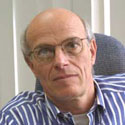Academic Editors
The following people constitute the Editorial Board of Academic Editors for PeerJ. These active academics are the Editors who seek peer reviewers, evaluate their responses, and make editorial decisions on each submission to the journal. Learn more about becoming an Editor.

Michael F Olson
Professor and Tier 1 Canada Research Chair in the Department of Chemistry and Biology of Ryerson University in Toronto Canada. Professor Olson's lab has focused on characterizing how Rho GTPase signalling pathways contribute to cancer, with the ultimate goal of identifying critical elements that could be targeted with small molecule inhibitors. Editor in Chief of the journal Small GTPases, and on the editorial boards of Molecular and Cellular Biology, Journal of Molecular Medicine, PLoS One, Scientific Reports. Science Proceedings, F1000 Research and PeerJ. Elected as a Fellow of the Royal Society of Biology.

Igor V. Florinsky
Igor Florinsky is a Principal Research Scientist at the Keldysh Institute of Applied Mathematics, Russian Academy of Sciences. He is an author, co-author, or editor of over 140 publications including 3 books, 2 edited volumes, 55 papers in peer-reviewed journals, and 15 peer-reviewed book chapters. His research interests include digital terrain modeling and geomorphometry, interrelationships between topography, soils, and tectonics, and the influence of the geological environment on humans, society and civilization.

Andrea Cucco
Andrea Cucco is a scientist in physical oceanography at the Institute of Coastal Marine Environment of the Italian National Research Council. He is focused on numerical modeling and, specifically, on the development and application of hydrodynamic and environmental models based on the finite elements methods. His research activity and scientific production is highly interdisciplinary and related to several aspects of the oceanography including the reproduction of the sea currents and wind waves in coastal and near-shore areas, the transport and diffusion processes occurring at the sea surface as well the interactions between the physical environment and the marine ecosystem. He is involved in several research initiatives aimed to predict the risk and the danger coming from the potential and accidental release of hydrocarbons in the marine environment. PhD in Marine Environmental Science at Ca’ Foscari University in Venice, Member of IAPSO from 2016.

Julia Kzhyshkowska
1997: PhD Cancer Research Centre of the Russian Academy of Medical Sciences, Moscow.
1997-2001: Postdoc at the University of Regensburg
2001-2007: Junior group leader/PI and lecturer, University of Heidelberg.
2007- 2010:Senior group leader/PI and senior lecturer, University of Heidelberg
2010-2013: Professor, head of the Lab for Cellular and Molecular Biology of Innate Immunity;
2013-permanent: Professor, head of Department for Innate Immunity and Tolerance, University of Heidelberg.

Mauro Rossi
Mauro Rossi is an expert on mapping, modeling and forecasting of landslides, floods and erosion processes in different geo-environmental and anthropic contexts. He has developed (i) new methodologies for statistical and deterministic analysis of the susceptibility and hazard posed by different geo-hydrological phenomena and for the estimation of their impacts, (ii) new statistical approaches to the definition of rainfall thresholds for triggering Landslides, (iii) early warning systems, (iv) approaches to the design optimal models for estimating landslide susceptibility and for the assessment of social risk posed by landslides and floods. He has also developed specific softwares for the landslide susceptibility modelling, for the landslide magnitude modelling and for the joint modeling of landslides and erosion processes in relation to different scenarios of geomorphological, climatic, vegetational and anthropic changes, in order to adequately characterize the hillslopes and the hydrological basins dynamics.

Kumaravel Somasundaram
Kumar Somasundaram is a Professor at Department of Microbiology Cell Biology, Indian Institute of Science, Bangalore, India. He obtained his Veterinary Medicine degree (1985) from Madras Veterinary College, Masters in Biotechnology (1987) and Ph.D. in bacterial genetics (1993) from Madurai Kamaraj University, Madurai, India. Subsequently, he did his post-doctoral training at Northwestern University and University of Pennsylvania in Cancer Biology before moving to Indian Institute of Science (1999) as a faculty. The major focus of his laboratory is genetics of glioma, the most common primary adult cancer

Charlotte Lindqvist
Assistant Professor, Department of Biological Sciences, University at Buffalo 2010-present; Postdoctoral Fellow/Research Associate, University of Oslo 2003-2008; PhD, University of Copenhagen 2003.

Olivier Civelli
Chair and Professor, Pharmacology and Eric L. and Lila D. Nelson Chair in Neuropharmacology, School of Medicine, University of California, Irvine.

Kevin J Duffy
My research background is diverse; the common thread being the application of computational methods to ‘real world’ questions from the sciences. As can be seen in my publication list a strong emphasis of this has been in the natural science. Much of this work has been to understand environmental issues using interdisciplinary research by combining the mathematical, physical and biological sciences and in particular using computational models.

David B Norman
Odell Fellow in the Natural Sciences at Christ's College Cambridge, University Reader in the Natural Sciences and Curator of Fossil Vertebrates at the Sedgwick Museum of Earth Sciences. Chairman of the Charles Darwin & Galapagos Islands Trust Fund. Associate Editor (and former Editor) of the Zoological Journal of the Linnean Society of London. Council Member of the Cambridge Philosophical Society.

Nijiro Nohata
Nijiro Nohata, M.D., Ph.D. Principal Scientist of Oncology Science Unit, MSD K.K., Japan. Active member of ASCO, ESMO, JSMO, JCA

Matthew J Powell-Palm
Dr. Matthew Powell-Palm is a Professor of Mechanical Engineering / Materials Science and Engineering at Texas A&M, working on matters of core materials thermodynamics, phase change processes, cryopreservation, and low-temperature aqueous physics writ large.

